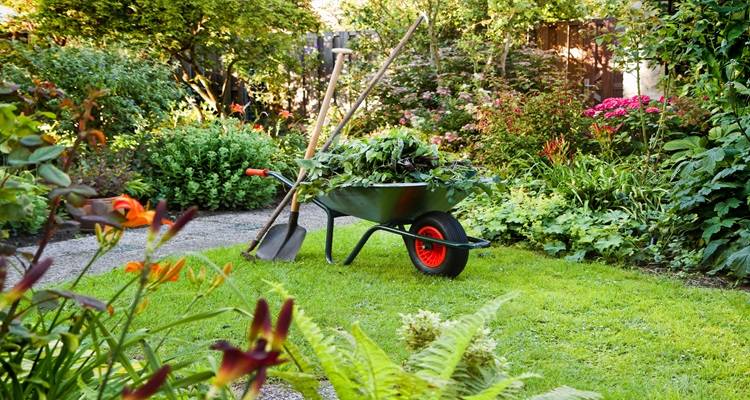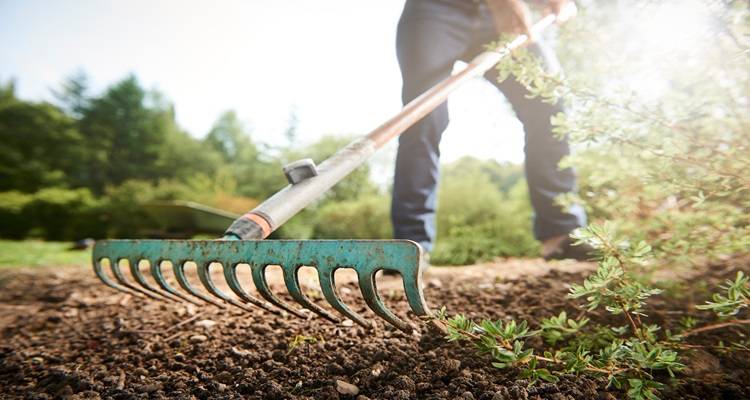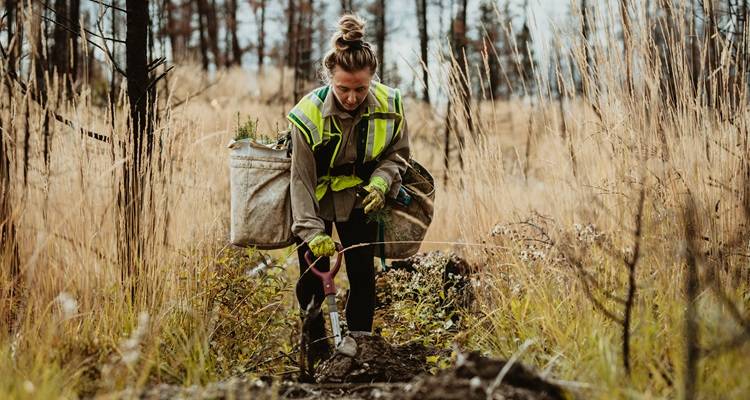How to Become a Gardener
Whether you’re a young adult looking to explore potential careers in the gardening and outdoor industry, wondering how to become a gardener, or are someone already in the trade but wanting to retrain or specialise in an alternative area, this article will explain everything you need to know about becoming a gardener and what to expect.

Let’s get started.
Table of Contents
What Does A Gardener Do?
Gardening is an excellent choice if you’re looking for a job with variation. No two days look the same, and you’ll always have the changing seasons and weather patterns to contend with.

Depending on your exact role and location, your daily tasks and responsibilities as a gardener could be:
- Plant, dig and routinely weed/deadhead flower beds and borders
- Ensure shrubs and trees are kept in good condition, clearing paths where necessary and cutting back bushes
- Lay turf and dig out land
- Ad-hoc pest control, making sure any pests detrimental to a plant’s health are taken care of
- Build sheds, lay patios and fences
As a gardener, you’ll have access to various equipment and supplies, from lawnmowers and hedge trimmers to pesticides and plant feed. You must be careful with these and handle equipment/supplies with care to ensure they don’t pose a risk to yourself or anyone else around you.
Are Gardeners In Demand In The UK?
The short answer? Yes, gardeners are in demand in the UK. Since the COVID-19 pandemic began in 2020, there has been a gardening boom in the UK as more people have stayed home and spent more time in their properties. As a result, gardening saw an uptick in interest, with a report from the University of Surrey showing that 60% of homeowners visited their gardens at least once daily.

Looking at the online search data from early 2020 in the UK, Adido Digital reported a rise in the following terms:
- Bistro set
- Garden bench
- Garden dining set
- Garden sofa
- Sun loungers
Searches for roses and daffodils also rose significantly during 2020, showing a growing trend for garden-friendly plants and flowers. What’s more, Horticulture Magazine reports that 87% of UK homes have a garden, and a huge £6.5 billion is spent by homeowners on gardening products each year. 87% of those people want to bring more wildlife to their gardens, giving a clear calling for gardeners.
Average Gardener Salary
So, with all this in mind, there’s a question we’ve yet to answer. How much do gardeners make?
Your income as a gardener can naturally fluctuate throughout the year due to increased or decreased demand in certain seasons. Let’s take a look at the average gardening salaries in the UK:
| Gardening Seniority/Position | Income Per Hour | Income Per Day | Income Per Year |
|---|---|---|---|
| Apprentice gardener | £5 | £40 | £9,000 |
| Newly-qualified gardener | £10 | £80 | £18,000 |
| Experienced gardener | £14 | £115 | £29,500 |
| Self-employed sole trader | £35 | £280 | £50,000 |
| Limited company business owner | £45 | £365 | £67,000 |
All figures are estimates, pre-tax.
As you’d expect, the more experience you have as a gardener, the higher your income will be. Gardening apprentices currently take home around £9,000 per year (pre-tax), while more experienced gardeners can earn around £29,500 per year (pre-tax).

Let’s compare this salary to the National Living Wage and National Minimum Wage as updated in April 2024:
| 21 and over | 18 to 20 | Under 18 | Apprentice |
|---|---|---|---|
| £11.44 | £8.60 | £6.40 | £6.40 |
Correct as of April 2024, Gov.uk
Apprentice gardeners can earn around £5 an hour, £1.40 less than the national minimum wage. Newly qualified gardeners can earn around £10 an hour, more than the national minimum wage but slightly less than the national living wage if you’re 21 and over. Once experienced, your earnings rise to £14 an hour, which is £2.56 more than the national living wage of £11.44.
Switching from working for someone to working for yourself can dramatically boost gardeners' earnings. Self-employed gardeners see a dramatic increase in their income to around £50,000 per year (pre-tax). Limited business owners can earn even more, charging £45 per hour or £365 per day. This averages around £67,000 (pre-tax) per year.
However, all of this income is not just straight profit. Business owners must account for business expenses and running costs–something that won’t impact gardeners working for someone else. Here’s what you’ll need to consider if you’re thinking of running your own gardening company:
- Business and equipment insurance - being self-employed, you’ll be responsible for the safety and security of your equipment, and you’ll also need adequate insurance to protect yourself and your business against any potential legal claims or damage that may occur while working. Public liability insurance is the most popular option.
- Tools and equipment - depending on your gardening niche, you may need basic gardening tools like forks, spades, trowels, and rakes or more specialised equipment.
- PPE - depending on your gardening niche, if you’re working with harmful chemicals or dangerous equipment, you’ll need to ensure you and anyone working for/with you have the appropriate protection.
- Vehicles and fuel - either hired or purchased to bring tools and equipment to the site and fuel will be part of your business expenditure.
These expenses will likely cost £6,500 for self-employed gardeners and over £10,000 per year for limited company business owners.
Gardening Career Requirements
With several different ways of getting into the gardening industry, educational grade requirements are just one way of getting admitted to college courses. Here’s what Gov.uk suggests as minimum requirements:
- 4 or 5 GCSEs at grades 9 to 4 (A* to C), or equivalent, for a level 3 course
- 2 or more GCSEs at grades 9 to 3 (A* to D), or equivalent, for a level 2 course
- 2 or fewer GCSEs at grades 3 to 1 (D to G), or equivalent, for a level 1 course
However, there are equivalent grade requirements if you don’t meet those listed here.

In addition to these, you’re likely to need to complete a criminal record check, prove you have a driving licence, and demonstrate the physical ability to take on the role of a gardener, as it is a physically demanding position.
Other soft skills may be useful to be successful as a gardener. These can include:
- Basic customer service skills
- Basic computer skills
- Good time management skills
- Teamworking capabilities
- Problem-solving attitude
- Good work ethic and timekeeping
- Good attention to detail
This is good news for those wanting to retrain as a gardener, as you’re likely to have picked up these soft skills in other employment.
How Long Does It Take To Become A Gardener?
There are many different ways to become a gardener, each with its own timeline. These routes can include:
- College/sixth form courses (Level 1 Certificate in Horticulture Skills, Level 2 Diploma in Practical Horticultural Skills, Level 3 Extended Diploma in Horticulture)
- Apprenticeships and learning on the job (Horticulture or Landscape Construction Operative Level 2 Intermediate Apprenticeship, Landscape or Horticulture Supervisor Level 3 Advanced Apprenticeship, Horticulture and Landscaping Technical Manager Level 5 Higher Apprenticeship)
- Specialist courses run by a professional body
- Volunteering (The Conservation Volunteers, the National Trust and The Wildlife Trusts)
To give an idea of timescales, the Horticulture or Landscape Construction Operative Level 2 Intermediate Apprenticeship takes 24 months to complete, and the government will grant up to £6,000 in funding for course fees.

Moving higher up the career ladder, the more specialised your training is, the longer it’ll take to complete. The Horticulture and Landscaping Technical Manager Level 5 Higher Apprenticeship takes 36 months to complete, and the government’s maximum funding for this level is £17,000.
Gardening Qualifications
There are several different ways to get into the gardening industry, and the qualifications you’ll need can differ depending on your chosen route.
If you’re looking for an educational pathway, you’ll typically need the following to sign up for a college course as suggested by Gov.uk as the minimum requirements:
- 4 or 5 GCSEs at grades 9 to 4 (A* to C), or equivalent, for a level 3 course
- 2 or more GCSEs at grades 9 to 3 (A* to D), or equivalent, for a level 2 course
- 2 or fewer GCSEs at grades 3 to 1 (D to G), or equivalent, for a level 1 course
However, there are equivalent grade requirements if you don’t meet those listed here. The main courses you’ll want to consider are:
- Horticulture - a general course enabling you to work in the green industry with the practical knowledge needed to maintain turf, care for plants and design gardens.
- Practical Horticulture Skills - learning in a practical setting, course attendees will learn about preparing ground, applying fertilisers, plant production and turf care.
As the most essential training, you’ll need to have completed the Level 1 Certificate in Horticulture Skills to have basic skills and understanding of horticulture. Even if you’re starting as a gardener’s apprentice, it’s a good idea to get this qualification independently so that employers can see your commitment to the trade when you apply for jobs in the future.

Once you decide on a gardening niche, you can take more specialised courses to hone and refine your trade.
Gardening Career Progression
As your experience as a gardener increases, you can offer more services to your customers. This will increase your potential earnings while giving you a broader understanding of the green environment.
Here are a few niches you may want to consider when choosing a specialism:
- Environmental Conservation - this course forms part of the essential framework for those wanting professional development in land-based industries. It will teach the business side of environmental work, from regulations and legislation to business operations and principles.
- Forestry and Arboriculture - available at levels 2 and 3, this course gives in-depth insights into the science of forestry, covering tree pests and diseases, the legal statuses of protected trees, and plant science, taught in a practical manner.
- Head Gardener/Consultant - if you want to work in large manor houses maintaining vast gardens and parks, joining gardening and groundskeeper teams can be great. Salaries for gardeners at large estates start from £24,000.
- Landscaper - if you want to focus on creating and maintaining residential gardens, commercial parks and other outdoor areas, a career as a landscaper might be a good match. With a starting salary of £20,000, this can be an excellent way to enter the industry.
- Trees and Timber - suitable for those wanting a career in forestry, including forestry establishment, arboriculture and green wood trades. With the average salary being £21,000 for new surgeons to £34,000 for experienced traders, tree surgery can be a lucrative industry. To qualify as a tree surgeon, you will need relevant qualifications in forestry, arboriculture, countryside or forest management.

It’s also good to bear in mind the emerging trends in the gardening industry which have the potential to hold unclaimed income:
- Minimalist gardens - continuing the sustainable trend, minimalist gardens are low-maintenance outdoor spaces populated with native plants and drought-resistant species, cared for using eco-friendly supplements instead of “traditional” harmful chemicals and fertilisers while reducing water usage and promoting local wildlife.
- Therapeutic gardens - these are another option for homeowners with limited space. They feature thoughtfully positioned water features and soothing elements to promote better mental health and rejuvenation.
- Vertical gardening - popular in densely populated cities, vertical gardening is growing in popularity for those wanting to have an outdoor space without the “traditional” footprint of an average garden. This uses vertical space for growing plants and flowers instead of just the flat plain of grass and can be an incredibly lucrative niche for London gardeners who want to appeal to the market conditions.
- Xeriscaping - an unfamiliar term for most, xeriscaping is helpful in drought-prone areas to conserve water and reduce the need for irrigation by using drought-tolerant plants in the garden’s design. This is an excellent option for homeowners in dry areas with an eco-friendly focus.
Investing your time in training in these areas can glean higher incomes, especially if you’re catering to a specific market, such as those living in densely populated cities with limited outdoor space.
Retraining As A Gardener
The joy of gardening is that it can be suitable for all ages–while apprentices are commonly teenagers, it’s not uncommon to see the older generation retraining as gardeners after a hectic career in an office environment. While there may be some physical limitations about age–it may be harder to do as much strenuous work as younger generations–there are still ample opportunities in gardening, whatever your age.
There Is No Age Limit
Gardeners Illustrated says not to worry about your age–gardening is a “non-ageist” profession. They state that courses welcome students aged 16 or 60, and as long as you can demonstrate a familiarity and interest with the outside world, you’ll be welcome on a course.
Get Hands-On Experience Through Volunteering
Local churches often need volunteers to help take care of their gardens. This can be a great way to get into the industry with little to no commitment if you want to explore the trade and understand if a career in gardening is right for you.
Take It At Your Own Pace
While some gardening courses have set timelines, such as 24 months or 36 months, if you’re learning on the job or volunteering, you can do these things alongside other jobs or when you have the time, reducing the stress of switching careers. Of course, if you want to fast-track your training and get into the industry as quickly as possible, you can also take express courses.

Take Advantage of Funding
If you want to apply for courses, government funding is available, ranging from a few thousand pounds up to £15,000.
How Do I Get Started?
This page on Gov.uk has all you need to know about starting a career as a gardener, from entry requirements to course ideas and specialisms, as well as what you can expect day-to-day in the role. It has a clear timeline of events, from early career training to more advanced specialisms and routes, along with their expected salaries and job titles, helping you to make an informed decision about your gardening career and progression.
Summary
There are a reported 158,700 individuals working as self-employed gardeners in the UK. With an increase in demand for gardeners since the rise of remote working and people spending more time at home, it’s a lucrative move if you’re ready to leap.
Here are our key takeaways:
- Newly qualified gardener earnings can start at £18,000 per year (pre-tax), and rise to £29,500 per year (pre-tax) for experienced gardeners of 1 to 5 years.
- Gardeners have been in high demand since 2020, thanks to homeowners spending more time in their properties due to the boom in remote working.
- The more experience you have as a gardener, the higher your earning potential.
- Gardeners working in London and the southeast of the UK can charge more than those in the north, and materials and fuel are likely to cost more, too.
- Specialisms in tree surgery, organic gardening or horticulture can further expand your potential income.
Whether you want to specialise in a specific area of gardening or try something completely new, gardening is an evergreen trade with ample demand–as long as you don’t mind working in the rain and wind!
NEXT STEPS
If you want to get started, the best place to start is the Gov.uk website. This page has all you need to know about starting a career as a gardener, from entry requirements to course ideas and specialisms, as well as what you can expect day-to-day in the role.
FAQs
What’s the Average Income for a Gardener in the UK?
A big boost to gardeners’ earnings comes from switching from working for someone to working for yourself. Self-employed gardeners see a dramatic increase in their income to around £50,000 per year (pre-tax). Limited company business owners can earn even more, charging £45 per hour or £365 per day. This averages around £67,000 (pre-tax) per year.
How Do I Get Practical Gardening Experience?
Plenty of experience can also come from work placements which are common components of gardening courses and lessons. In some cases, these placements can also lead to job offers which can give you a handy start in the industry.
Do I Need My Own Gardening Tools?
Do I Need Specific Qualifications or Certifications to Become a Gardener?
- College/sixth form courses (Level 1 Certificate in Horticulture Skills, Level 2 Diploma in Practical Horticultural Skills, Level 3 Extended Diploma in Horticulture)
- Apprenticeships and learning on the job (Horticulture or Landscape Construction Operative Level 2 Intermediate Apprenticeship, Landscape or Horticulture Supervisor Level 3 Advanced Apprenticeship, Horticulture and Landscaping Technical Manager Level 5 Higher Apprenticeship)
- Specialist courses run by a professional body
- Volunteering (The Conservation Volunteers, the National Trust and The Wildlife Trusts)
How Do I Start My Own Gardening Business in the UK?
Starting your own business is wise if you’ve worked in the gardening industry for several years, understand the landscape, and have a set of clients ready to make your first customers. To register as self-employed, you’ll need to go to Gov.uk to set up your company and, if necessary, enlist the help of an accountant to ensure your financials are in check when the time comes to file your company’s tax return.
Sources
https://nationalcareers.service.gov.uk/job-profiles/gardener
https://www.nationaltrustjobs.org.uk/life-at-the-national-trust/how-to-get-into-gardening
https://uk.indeed.com/career-advice/finding-a-job/how-to-become-a-gardener
https://www.thegardenersguild.co.uk/garden_maintenance.html
https://horticulture.co.uk/gardening/statistics/
https://www.statista.com/statistics/319328/number-of-gardeners-and-landscape-gardeners-in-the-uk/
https://www.gov.uk/national-minimum-wage-rates








